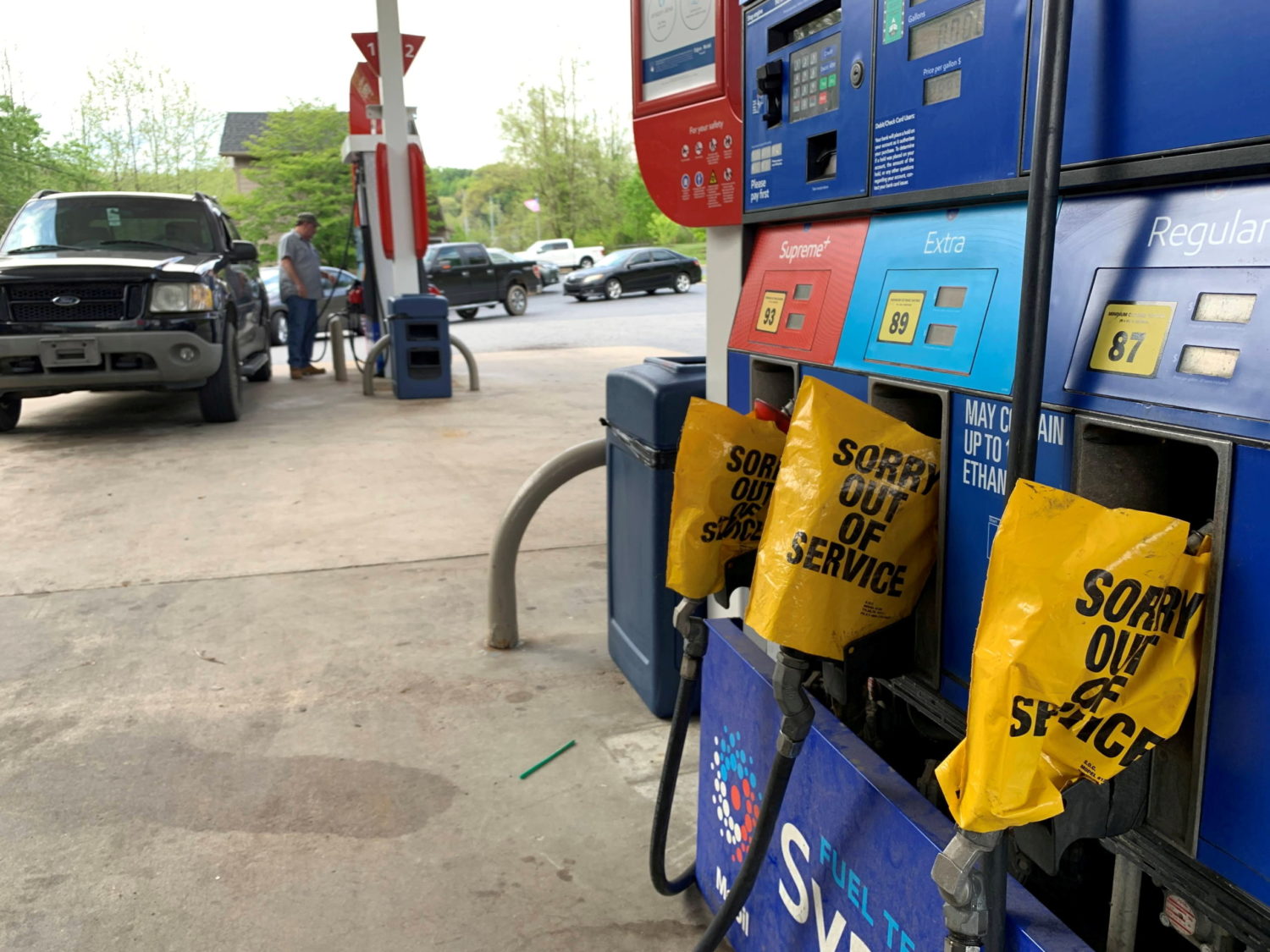
By Stephanie Kelly
(Reuters) – Fuel shortages worsened and tensions rose in the southeastern United States on Wednesday, as the shutdown of the largest U.S. fuel pipeline network entered its sixth day and Washington officials pledged new steps to alleviate supply issues.
Fistfights at gas stations were reported as tensions bubbled. One video showed an altercation between two customers at a station in North Carolina.
A ransomware attack on the Colonial Pipeline last week halted 2.5 million barrels per day of fuel shipments. The pipeline stretches 5,500 miles (8,850 km) from U.S. Gulf Coast oil refineries to consumers in Mid-Atlantic and Southeast states.
Nearly 60% of gas stations in metro Atlanta were without gasoline, tracking firm GasBuddy said. Its survey showed 65% of stations in North Carolina and 43% in Georgia and South Carolina without fuel. Virginia also reported high outages.
U.S. Transportation Secretary Pete Buttigieg said the administration is addressing the fuel shortages and helping restore Colonial operations, including moving gasoline to places that need it.
“Our top priority right now is getting the fuel to the communities that need it, and we will continue doing everything that we can to meet that goal in the coming days,” Buttigieg told reporters at the White House.
There was no word from Colonial on a resumption of full operations after the most disruptive cyberattack on U.S. energy infrastructure. Its top executive would decide by the end of Wednesday if it were possible to restart, U.S. Energy Secretary Jennifer Granholm said on Tuesday.
The supply crunch sparked panic buying in the U.S. Southeast, bringing long lines and high prices at gas stations ahead of the Memorial Day holiday weekend at the end of May, the traditional start of the peak summer driving season.
At a Citgo station in East Atlanta, Charles Williams, 66, an Atlanta-based musician, filled his wife’s Mini Cooper, after seeing people with large jerry cans loading up.
“I wouldn’t say I know they’re hoarding, but I don’t know if they’re helping,” he said. “If gas is getting sold out everywhere, yeah, it’s time to start to worry.”
Privately owned Colonial Pipeline opened portions of the line manually in Georgia, Maryland, New Jersey and the Carolinas. It also accepted 2 million barrels of fuel to begin efforts to “substantially” restore operations by week’s end, the company has said.
The average national gasoline price rose to above $3.00 a gallon, the highest since October 2014, the American Automobile Association said.
HOARDING CREATING MORE SHORTAGES
Fuel industry representatives urged consumers to stop panic buying. They noted the country has plenty of gasoline supplies and said hoarding is creating shortages in areas not served by the pipeline.
“Retailers right now have sold several days worth of inventory within a few hours,” said Rob Underwood, President of the Energy Marketers of America.
Four southeastern states – Florida, North Carolina, Virginia and Georgia – joined federal regulators in relaxing driver and fuel restrictions to speed deliveries of supplies. Georgia suspended sales tax on gasoline until Saturday.
The FBI has accused a shadowy criminal gang called DarkSide of the ransomware attack. The group, believed to be based in Russia or Eastern Europe, has not directly taken credit for the Colonial hack, but on Wednesday it claimed to have breached systems at three other companies, including an Illinois tech firm.
Russia’s embassy in the United States rejected speculation that Moscow was behind the attack. President Joe Biden on Monday said there was no evidence so far that Russia was responsible.
REFINERS, AIRLINES REACT
It is unknown how much money the hackers are seeking, and Colonial has not commented on whether it would pay.
Gulf Coast refiners that move fuel to market on the Colonial Pipeline have cut processing. Total SE trimmed gasoline production at its Port Arthur, Texas, refinery, and Citgo Petroleum pared back at its Lake Charles, Louisiana, plant.
Citgo said it was moving products from Lake Charles and “exploring alternate supply methods into other impacted markets.” Marathon Petroleum said it was “making adjustments.”
Several airlines have been transporting fuel by truck or fueling planes at destinations rather than at East Coast origins. American Airlines has made changes to two long-haul flights out of Charlotte, North Carolina – one of its hub airports – through Friday.
(Reporting by Stephanie Kelly in New York; Additional reporting by Laila Kearney in New York, Rich McKay in Atlanta, Tracy Rucinski in Chicago, and Timothy Gardner in Washington; Editing by Leslie Adler, Steve Orlofsky and David Gregorio)





